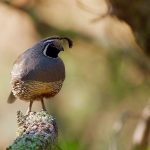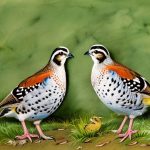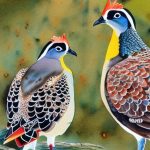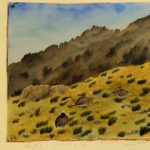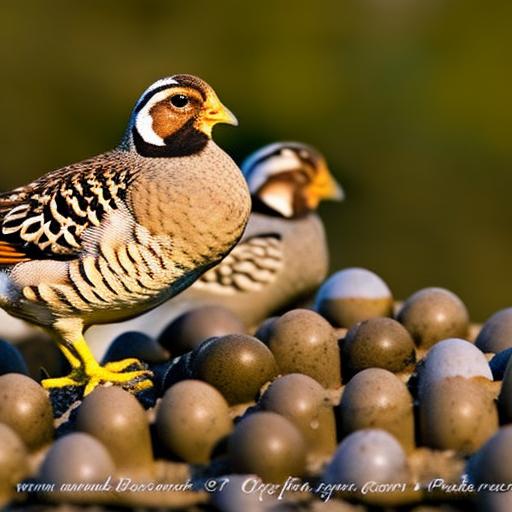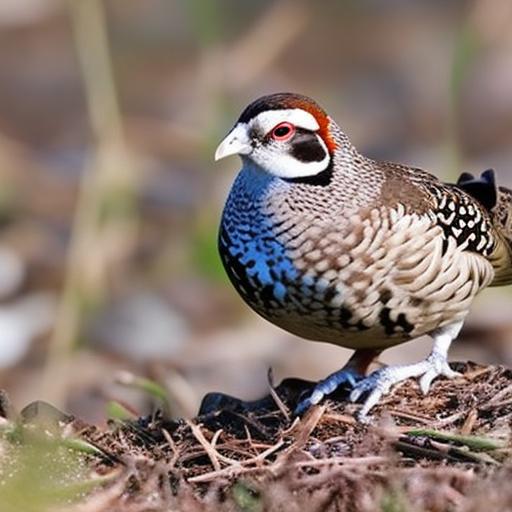Quail breeding has a long and storied history in the state of Georgia. The tradition of quail hunting has been a beloved pastime for generations, and as a result, the breeding of quail has become an integral part of the state’s culture and economy. The practice of breeding quail in Georgia can be traced back to the early 1900s when the state’s abundant natural resources and favorable climate made it an ideal location for quail farming. In the early days, quail breeding was primarily done for the purpose of replenishing wild populations for hunting, but over time, it evolved into a thriving industry in its own right.
The development of modern quail breeding techniques in Georgia can be attributed to the efforts of dedicated breeders and conservationists who recognized the need to preserve and protect the state’s native quail species. Through careful breeding and management practices, these individuals were able to establish sustainable populations of quail that could be used for both hunting and conservation purposes. Today, Georgia is widely regarded as one of the premier quail breeding regions in the United States, thanks in large part to the pioneering work of these early breeders. As a result, the state has become a hub for quail enthusiasts and breeders from around the country, further solidifying its reputation as a leader in the industry.
Table of Contents
- 1 The process of breeding and raising quail in Georgia
- 2 The challenges and rewards of being a quail breeder in Georgia
- 3 The impact of quail breeding on Georgia’s economy and wildlife conservation efforts
- 4 The different species of quail commonly bred in Georgia
- 5 The role of quail breeders in preserving and promoting the tradition of quail hunting in Georgia
- 6 The future of quail breeding in Georgia and potential opportunities for growth and development
- 7 FAQs
- 7.1 What is a quail breeder?
- 7.2 What does a quail breeder do?
- 7.3 Where can I find a quail breeder in Georgia?
- 7.4 What should I look for in a quail breeder in Georgia?
- 7.5 What types of quail do breeders in Georgia typically raise?
- 7.6 Are there any regulations or permits required for quail breeding in Georgia?
Key Takeaways
- Quail breeding has a long history in Georgia, dating back to the early 1900s when it became a popular pastime for sportsmen and farmers.
- The process of breeding and raising quail in Georgia involves careful selection of breeding stock, proper housing and nutrition, and disease prevention measures.
- Quail breeders in Georgia face challenges such as predation, disease, and market competition, but the rewards include contributing to wildlife conservation and enjoying a sustainable business.
- Quail breeding has a significant impact on Georgia’s economy, providing revenue from hunting, tourism, and the sale of quail and related products, while also supporting wildlife conservation efforts.
- The most commonly bred species of quail in Georgia include the Northern Bobwhite and the Gambel’s Quail, both of which are well-suited to the state’s climate and habitat.
- Quail breeders play a crucial role in preserving and promoting the tradition of quail hunting in Georgia, which has deep cultural and historical significance in the state.
- The future of quail breeding in Georgia holds potential for growth and development, with opportunities for ecotourism, habitat restoration, and partnerships with conservation organizations.
The process of breeding and raising quail in Georgia
Breeding and raising quail in Georgia is a complex and multifaceted process that requires a deep understanding of the birds’ biology and behavior. The first step in the breeding process is selecting healthy, genetically diverse breeding stock that will produce strong and resilient offspring. This involves carefully evaluating the physical characteristics and genetic makeup of individual birds to ensure that they are well-suited for breeding. Once the breeding stock has been selected, breeders must provide them with optimal living conditions, including spacious enclosures, proper nutrition, and access to clean water. This is essential for ensuring the health and well-being of the birds, as well as maximizing their reproductive potential.
After the breeding stock has been established, breeders must carefully monitor the birds’ reproductive cycles to determine the optimal time for mating. This often involves closely observing the birds’ behavior and physical cues to identify when they are most receptive to breeding. Once mating has occurred, breeders must carefully monitor the nesting and hatching process to ensure that the eggs are properly incubated and that the chicks receive adequate care and nutrition. This often involves providing supplemental heat and humidity to mimic the conditions of natural incubation, as well as closely monitoring the chicks’ development to identify any potential health issues. Overall, breeding and raising quail in Georgia is a labor-intensive process that requires a high level of expertise and dedication to ensure the success of the breeding program.
The challenges and rewards of being a quail breeder in Georgia
Being a quail breeder in Georgia comes with its own set of unique challenges and rewards. One of the biggest challenges that breeders face is maintaining sustainable populations of quail in the face of habitat loss and other environmental pressures. This often requires breeders to work closely with conservation organizations and government agencies to implement habitat restoration projects and other initiatives aimed at protecting quail populations. Additionally, breeders must also contend with disease outbreaks, predation, and other factors that can impact the health and well-being of their birds. This often requires implementing strict biosecurity measures and other protocols to minimize the risk of disease transmission and other threats to the birds.
Despite these challenges, being a quail breeder in Georgia also comes with a number of rewards. For many breeders, the opportunity to work closely with these fascinating birds and contribute to their conservation is incredibly fulfilling. Additionally, many breeders take great pride in knowing that their efforts are helping to preserve a cherished tradition that has been passed down through generations. Furthermore, successful breeders also have the opportunity to generate income through the sale of quail for hunting purposes, as well as through ecotourism ventures such as guided quail hunts and birdwatching tours. Overall, while being a quail breeder in Georgia certainly has its challenges, it also offers a wealth of opportunities for personal and professional fulfillment.
The impact of quail breeding on Georgia’s economy and wildlife conservation efforts
The impact of quail breeding on Georgia’s economy and wildlife conservation efforts cannot be overstated. As one of the leading quail breeding regions in the United States, Georgia plays a crucial role in supplying birds for hunting preserves, wildlife management areas, and other conservation initiatives across the country. This has significant economic implications for the state, as it supports a thriving industry that generates revenue through the sale of birds, hunting licenses, and related services. Additionally, quail hunting also attracts thousands of visitors to Georgia each year, providing a significant boost to the state’s tourism industry.
From a conservation standpoint, quail breeding in Georgia has also had a profound impact on efforts to protect and preserve native quail species. By establishing sustainable populations of quail through careful breeding and management practices, breeders have helped to bolster wild populations and support habitat restoration efforts. This has not only benefited quail populations but has also had positive ripple effects on other wildlife species that share their habitat. Furthermore, many breeders actively participate in conservation initiatives aimed at protecting critical habitat for quail and other wildlife, further contributing to the state’s overall conservation efforts.
Overall, the impact of quail breeding on Georgia’s economy and wildlife conservation efforts is substantial. By supporting a thriving industry and contributing to conservation initiatives, quail breeders play a vital role in shaping the future of wildlife management and conservation in the state.
The different species of quail commonly bred in Georgia
In Georgia, several species of quail are commonly bred for hunting and conservation purposes. The most prevalent species is the Northern Bobwhite (Colinus virginianus), which is native to much of the eastern United States, including Georgia. Known for its distinctive call and striking plumage, the Northern Bobwhite is highly sought after by hunters and conservationists alike. Another commonly bred species is the Gambel’s Quail (Callipepla gambelii), which is native to the southwestern United States but has been successfully introduced to parts of Georgia. With its striking appearance and lively demeanor, Gambel’s Quail is a popular choice for hunting preserves and wildlife management areas.
In addition to these species, breeders in Georgia also work with other quail species such as California Quail (Callipepla californica) and Mountain Quail (Oreortyx pictus), both of which are native to western North America but have been successfully introduced to parts of Georgia. Each species has its own unique characteristics and habitat requirements, making them well-suited for different types of hunting preserves and conservation initiatives. Overall, by working with a diverse array of quail species, breeders in Georgia are able to offer a wide range of options for hunters and contribute to efforts aimed at preserving these iconic birds for future generations.
The role of quail breeders in preserving and promoting the tradition of quail hunting in Georgia

Quail breeders play a crucial role in preserving and promoting the tradition of quail hunting in Georgia. By establishing sustainable populations of quail through careful breeding practices, breeders help ensure that there are ample opportunities for hunters to pursue this beloved pastime for generations to come. Additionally, many breeders actively participate in efforts to promote ethical hunting practices and educate hunters about the importance of conservation. This often involves collaborating with hunting organizations, wildlife agencies, and other stakeholders to develop best practices for sustainable hunting and habitat management.
Furthermore, many breeders also play a key role in promoting the tradition of quail hunting through ecotourism ventures such as guided hunts and birdwatching tours. By offering these experiences to visitors from near and far, breeders help introduce new audiences to the joys of quail hunting while also generating revenue that supports their conservation efforts. Additionally, by sharing their knowledge and passion for these iconic birds with others, breeders help foster a greater appreciation for quail hunting and conservation among the public.
Overall, by preserving sustainable populations of quail and promoting ethical hunting practices, breeders in Georgia are instrumental in upholding the rich tradition of quail hunting while also contributing to efforts aimed at conserving these iconic birds.
The future of quail breeding in Georgia and potential opportunities for growth and development
The future of quail breeding in Georgia holds great promise, with numerous opportunities for growth and development on the horizon. As demand for sustainable hunting experiences continues to rise, there is an increasing need for breeders who can supply high-quality birds for hunting preserves and wildlife management areas. This presents an opportunity for existing breeders to expand their operations while also creating opportunities for new entrants into the industry.
Furthermore, as interest in ecotourism continues to grow, there is also potential for breeders to capitalize on this trend by offering guided hunts, birdwatching tours, and other experiences that showcase the natural beauty of Georgia’s quail habitats. By diversifying their offerings in this way, breeders can attract new audiences while also generating additional revenue that can support their conservation efforts.
In addition to these opportunities, there is also potential for breeders to play a greater role in habitat restoration initiatives aimed at supporting wild populations of quail and other wildlife species. By partnering with conservation organizations and government agencies, breeders can contribute their expertise and resources to projects that benefit both wild and captive-bred populations of quail.
Overall, the future of quail breeding in Georgia looks bright, with numerous opportunities for growth and development that can further solidify the state’s reputation as a leader in the industry while also contributing to efforts aimed at conserving these iconic birds for future generations.
If you’re a quail breeder in Georgia, you may also be interested in learning about innovative ways to improve your poultry housing. Check out this insightful article on how to insulate a chicken coop to ensure your quails are comfortable and protected from the elements. Proper insulation can make a significant difference in maintaining the health and productivity of your quail flock.
FAQs
What is a quail breeder?
A quail breeder is a person or business that specializes in breeding and raising quail for various purposes, such as meat production, egg production, or hunting.
What does a quail breeder do?
A quail breeder is responsible for selecting and breeding quail with desirable traits, providing proper care and nutrition for the birds, and managing the overall health and well-being of the quail flock.
Where can I find a quail breeder in Georgia?
Quail breeders in Georgia can be found through online directories, agricultural publications, or by contacting local agricultural extension offices or poultry associations.
What should I look for in a quail breeder in Georgia?
When looking for a quail breeder in Georgia, it is important to consider factors such as the breeder’s experience, reputation, and the quality of their quail stock. Additionally, it is important to ensure that the breeder follows ethical and humane breeding practices.
What types of quail do breeders in Georgia typically raise?
Quail breeders in Georgia may raise various species of quail, including the Northern Bobwhite quail, Coturnix quail, and other game bird species commonly found in the region.
Are there any regulations or permits required for quail breeding in Georgia?
Quail breeders in Georgia may be subject to regulations and permitting requirements set forth by the Georgia Department of Agriculture or other relevant state and local authorities. It is important for breeders to familiarize themselves with these regulations and ensure compliance.
Meet Walter, the feathered-friend fanatic of Florida! Nestled in the sunshine state, Walter struts through life with his feathered companions, clucking his way to happiness. With a coop that’s fancier than a five-star hotel, he’s the Don Juan of the chicken world. When he’s not teaching his hens to do the cha-cha, you’ll find him in a heated debate with his prized rooster, Sir Clucks-a-Lot. Walter’s poultry passion is no yolk; he’s the sunny-side-up guy you never knew you needed in your flock of friends!


